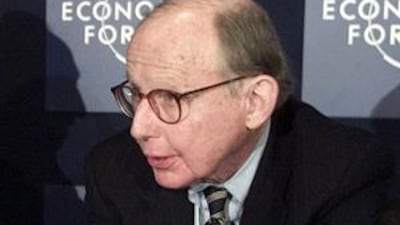The author and political scientist Professor Samuel Huntington, hailed by some as a visionary for his theories on the struggle between the West and Islam but decried by others as deliberately divisive, has died aged 81. Huntington was best known for The Clash of Civilizations and The Remaking of World Order, a controversial work that gained notoriety for its author in the wake of the terrorist attacks of September 11 2001.
Originally conceived in 1993 as an article in the policy journal Foreign Affairs, The Clash of Civilizations was published three years later as a book. Translated into 39 languages, with pirated copies even sold in Iran to the Revolutionary Guard, it thrust Mr Huntington, a longtime Harvard professor, on to the world stage. The late Arab-American scholar, Edward Said, was particularly scathing, referring to the book as "The Clash of Ignorance", that oversimplified complex issues to present a "West versus the rest" world view.
The premise of the book was the changing nature of conflict in the aftermath of the Cold War. Future wars would be neither purely nationalistic nor ideological in origin, such as Nazism and Communism, but cultural and religious, Huntington argued. He named eight major global civilisations: Western, Confucian, Japanese, Islamic, Hindu, Slavic-Orthodox, Latin American and a potential African civilisation comprising various countries that did not yet share a collective consciousness.
China and Islam were the primary challengers to the West; the former due to its economic dynamism, while the demographic trend in most Muslim countries of a significant proportion of the population being between 15 and 25 years old created conditions fertile for dissent. The response to such circumstances, according to Huntington, was to consolidate the West's position, with the US at the lead, exporting its values of human rights and democracy.
The book prompted calls by, among others, the former Iranian president Mohammad Khatami for dialogue in order to prevent such clashes. The disastrous invasion of Iraq under President George W Bush, of which Huntington was fiercely critical, illustrated the difficulties faced in actually implementing his theories. In 2004, he again courted controversy with Who Are We?, which addressed the allegedly detrimental effect the increasing presence of Latino immigrants was having on the culture, language and very essence of America.
Critics found the language used by the Harvard scholar uncomfortably reminiscent of white supremacist thought. Yet to many, Huntington was a brave commentator, unafraid to state what seemed obvious to him, whether on the broader global stage or within the domestic sphere. Samuel Phillips Huntington was born in New York on April 18 1927. He graduated from Yale with distinction at the age of 18 and entered the army before receiving his PhD from Harvard.
He was a member of Harvard's Department of Government from 1950, save for a brief period between 1959 and 1962 when he was associate professor of government at Columbia University. During 1977 and 1978 he worked at the White House as co-ordinator of security planning for the National Security Council. He died of congestive heart failure and complications arising from diabetes on Dec 24. He is survived by his wife Nancy and two sons.
* The National

